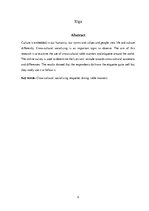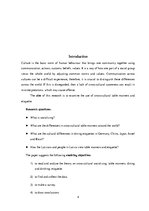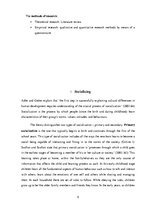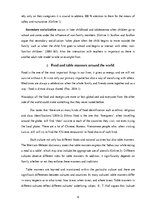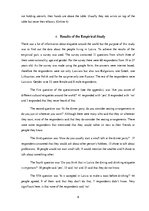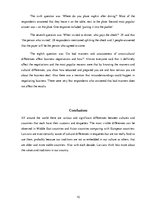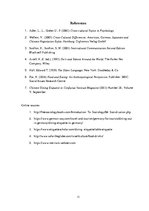-
Cross-cultural Differences - Table Manners and Etiquette Around the World
Referāts12 Socioloģija, Tulkošana, valodniecība, Vēsture, kultūra
| Nr. | Sadaļas nosaukums | Lpp. |
| Introduction | 4 | |
| 1. | Socializing | 5 |
| 2. | Food and table manners around the world | 5 |
| 3. | Dining etiquette and seating arrangements in different countries | 6 |
| 4. | Results of the empirical study | 8 |
| Conclusions | 9 | |
| References | 10 |
The seventh question was ‘When invited to dinner, who pays the check?’ 29 said that ‘the person who invited’, 28 respondents mentioned splitting the check and 3 people answered that the payer will be the person who agreed to come.
The eighth question was ‘Do bad manners and unawareness of cross-cultural differences affect business negotiations and how?’ Almost everyone said that it definitely affect the negotiations and the most popular reasons were that by knowing the manners and cultural differences, you show how educated and prepared you are and how serious you are about the business deal. Also there was a mention that misunderstandings could happen in negotiating business. There were very few respondents who answered that bad manners does not affect the results.
Conclusions
All around the world there are various and significant differences between cultures and countries that each have their customs and etiquettes. The most visible differences can be observed in Middle East countries and Asian countries comparing with European countries. Latvians are most certainly aware of cultural differences in etiquettes but are not really fond to use them, probably because our traditions are not as embedded in our culture as others, that are older and more stable countries. Also with each decade, Latvians think less more about the values and traditions in our country.
…
Culture is embedded in our humanity, our norms and values and people view life and culture differently. Cross-cultural socializing is an important topic to observe. The aim of this research is to examine the use of cross-cultural table manners and etiquette around the world. Communication across cultures can be a difficult experience; therefore, it is crucial to distinguish these differences across the world. If this is disregarded, then a lack of cross-cultural awareness can result in misinterpretations, which may cause offence.


